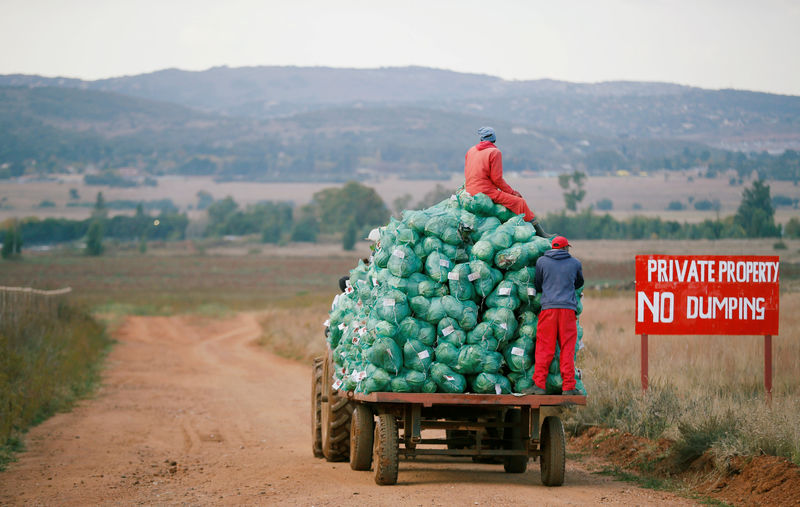 © Reuters. FILE PHOTO: Farm workers harvest cabbages at a farm in Eikenhof, near Johannesburg
© Reuters. FILE PHOTO: Farm workers harvest cabbages at a farm in Eikenhof, near JohannesburgBy Ed Stoddard
JOHANNESBURG (Reuters) – South Africa’s ruling African National Congress (ANC) is forging ahead with its plans to change the constitution to allow the expropriation of land without compensation.
U.S. President Donald Trump this week sent the rand into a tailspin by tweeting that he would ask Secretary of State Mike Pompeo to study South African “land and farm seizures” and the “killing of farmers”.
President Cyril Ramaphosa defends the plan, announced on Aug. 1, as no “land grab” from whites who still own most of South Africa’s territory. Here are the key issues in the debate.
WHAT NEEDS TO BE ADDRESSED?
South Africa has a history of colonial conquest and dispossession that pushed the black majority into crowded urban townships and rural reserves.
The 1913 Native Lands Act made it illegal for Africans to acquire land beyond these reserves, which became known as “Homelands”.
While blacks account for 80 percent of South Africa’s population, the former homelands comprised just 13 percent of the land. The traditional leaders that oversaw the homelands still hold significant sway.
Estimates vary but the consensus is that most privately owned land remains in white hands, making it a potent symbol of the wider economic and wealth disparities that remain two decades after the end of white-minority rule.
WHAT HAS BEEN DONE?
Since the end of apartheid in 1994, the ANC has followed a “willing-seller, willing-buyer” model under which the government buys white-owned farms for redistribution to blacks. Progress has been slow.
Based on a survey of title deeds, the government says blacks own four percent of private land, and only eight percent of farmland has been transferred to black hands, well short of a target of 30 percent due to have been reached in 2014.
AgriSA, a farm industry group, says 27 percent of farmland is in black hands. Its figure includes state land and plots tilled by black subsistence farmers in the old homelands.
Critics allege that many farms transferred to emerging black farmers have failed because of a lack of state support, an allegation Ramaphosa denies.
HAIL TO THE CHIEFS
The 17 million people who reside in the former homelands, a third of the population, are mostly subsistence farmers working tiny plots on communal land.
Critics of ANC land policy say that instead of seizing farmland from whites, such households should be given title deeds, turning millions into property owners. Reformers in the ANC have signaled their support for such a policy.
Former president Kgalema Motlanthe, who headed a panel of inquiry into the land issue, described traditional leaders as “village tin-pot dictators.”
Tribal chiefs were not amused, and warned the ANC in July to exclude territory under their control from its land reform drive. The Zulu King evoked the Anglo-Zulu war and the specter of conflict over the issue.
RISKS
Markets and investors are wary because of concerns about wider threats to property rights. The rand fell sharply and government bonds weakened after Ramaphosa’s announcement.
Yet analysts say South Africa is unlikely to follow the route of Zimbabwe, where the chaotic and violent seizure of white-owned farms under former president Robert Mugabe triggered economic collapse.
ANC officials have said unused land will be the main target.
Still, the risks are substantial. South Africa feeds itself and is the continent’s largest maize producer and the world’s second-biggest citrus exporter.
Agriculture accounts for less than three percent of national output but employs 850,000 people, five percent of the workforce. Threats to production would also fan food inflation, hurting low-income households.
WHY NOW?
Analysts say the ANC wants to appeal to poorer black voters, the core of the ANC’s support, ahead of elections next year.
The move also cuts into the platform of the EFF party, headed by firebrand Julius Malema, who has made land expropriation without compensation his clarion call.
Trump’s comments inflamed the high-octane debate on land, a country that remains deeply racially divided and unequal nearly a quarter of a century after Nelson Mandela swept to power at the end of apartheid.
Violent crime is a serious problem across South Africa and 47 farmers were killed in 2017-18, according to statistics from AgriSA, an association of agricultural associations. However the same figures show that farm murders are at a 20-year low.
But the issue has been a focus of outrage by right-wing organizations in South Africa and abroad.
Afriforum, which mostly champions white people’s rights in South Africa, has said it will intensify its campaign to inform the international community regarding the threat to property rights and farm murders in SA.
THE PROCESS
Some legal experts argued there was no need to amend the constitution because Section 25 states that if land is taken from a property owner, “compensation … must be just and equitable.”
To some, “just and equitable” could mean no compensation, depending on the circumstances in which previous occupants or owners were deprived of or removed from the land, either in British colonial times or under apartheid.
Ramaphosa has said South Africans are taking part in public hearings on land reforms that are being held countrywide, as they wanted the constitution to make clear when compensation was or was not justified.
The ANC is then expected to take its proposal to parliament, where a two-thirds majority is needed to change the constitution. Together with the leftist Economic Freedom Fighters (EFF), it has more than enough votes in the 400-seat parliament to effect the change.
Source: Investing.com





























